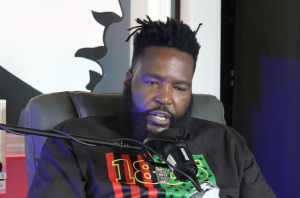In a heated discussion, Dr. Umar Johnson provided an update on the Frederick Douglass Marcus Garvey Academy, a school project that he has been working on for several years. The school, located in Wilmington, Delaware, is named after two prominent African American leaders, Frederick Douglass and Marcus Garvey.
Dr. Umar shared that the school building is nearing completion, with only a few renovations left to be done, such as installing new doors, applying a fresh coat of paint, and covering some floors. He emphasized that while the process has been lengthy, he hopes to have the building ready for inspection by the end of the summer and aims to start educating students by next summer.

Challenges in Institution Building
Dr. Umar admitted that one of the biggest challenges he faced was giving out specific dates for the school’s opening, which he regrets because unforeseen issues often arise, causing delays. He advised against setting public deadlines when working on significant projects like institution building, as it can lead to disappointment if those deadlines are not met. He also mentioned that the school, once operational, would be tuition-based, and he plans to serve as the principal and history teacher, ensuring his active involvement in the students’ education.
The State of Black Men and the Need for Organization
The conversation then shifted to broader issues affecting the Black community, particularly the state of Black men. Dr. Umar stressed the importance of organizing and reclaiming control over Black communities. He highlighted the need to focus on mentoring young Black boys who often grow up without father figures, criticizing institutions like the Black church for not doing enough in this regard. He urged Black men to collaborate rather than compete with each other, pointing out that unity among Black men is crucial in confronting systemic challenges.
Dr. Umar also touched on the importance of economic empowerment, stating that Black men need to build each other up economically by investing together and creating institutions that serve the community. He argued that Black men are seen as the biggest threat to the global white power structure, not because of any inherent danger, but because of their potential to disrupt the status quo if they unite and work towards common goals.
The Role of Hip Hop in Black America’s Decline
A significant portion of the discussion focused on the role of hip hop in Black America’s decline. Dr. Umar passionately argued that the hip hop community has betrayed Black America by glamorizing violence, misogyny, and materialism, which he believes has had a detrimental effect on the Black community, particularly on young Black men and women. He criticized hip hop artists for promoting negative stereotypes and failing to use their influence to uplift the community.
Dr. Umar went further to state that hip hop has done more to destroy the public image of Black men than even mainstream media. He pointed out that many hip hop artists no longer live in the communities they claim to represent and that their success often comes at the expense of the very people they once identified with. He expressed frustration with the lack of accountability within the hip hop industry, particularly when it comes to the negative impact that gangster rap has had on the community.
The Importance of African Spirituality and Education
In response to questions about the curriculum at the Frederick Douglass Marcus Garvey Academy, Dr. Umar emphasized the inclusion of African spirituality as a core subject. He clarified that while students will be required to learn about African spirituality, they will not be forced to practice it. This curriculum is intended to reconnect Black children with their ancestral roots and provide them with a sense of identity and pride in their heritage.
Dr. Umar also discussed his plans to serve as the school’s psychologist, focusing on the mental and emotional well-being of the students. He expressed concern about the psychological damage caused by systemic racism and the need for a psychological revolution within the Black community to address these issues.
Final Thoughts: The Path Forward
Dr. Umar concluded the discussion by reiterating the need for Black people to take control of their destiny through organization, education, and economic empowerment. He urged the Black community to build institutions that serve their needs and to stop relying on external forces for validation and support. Dr. Umar’s message was clear: the future of Black America depends on its ability to unite, organize, and reclaim control over its communities and institutions.

















